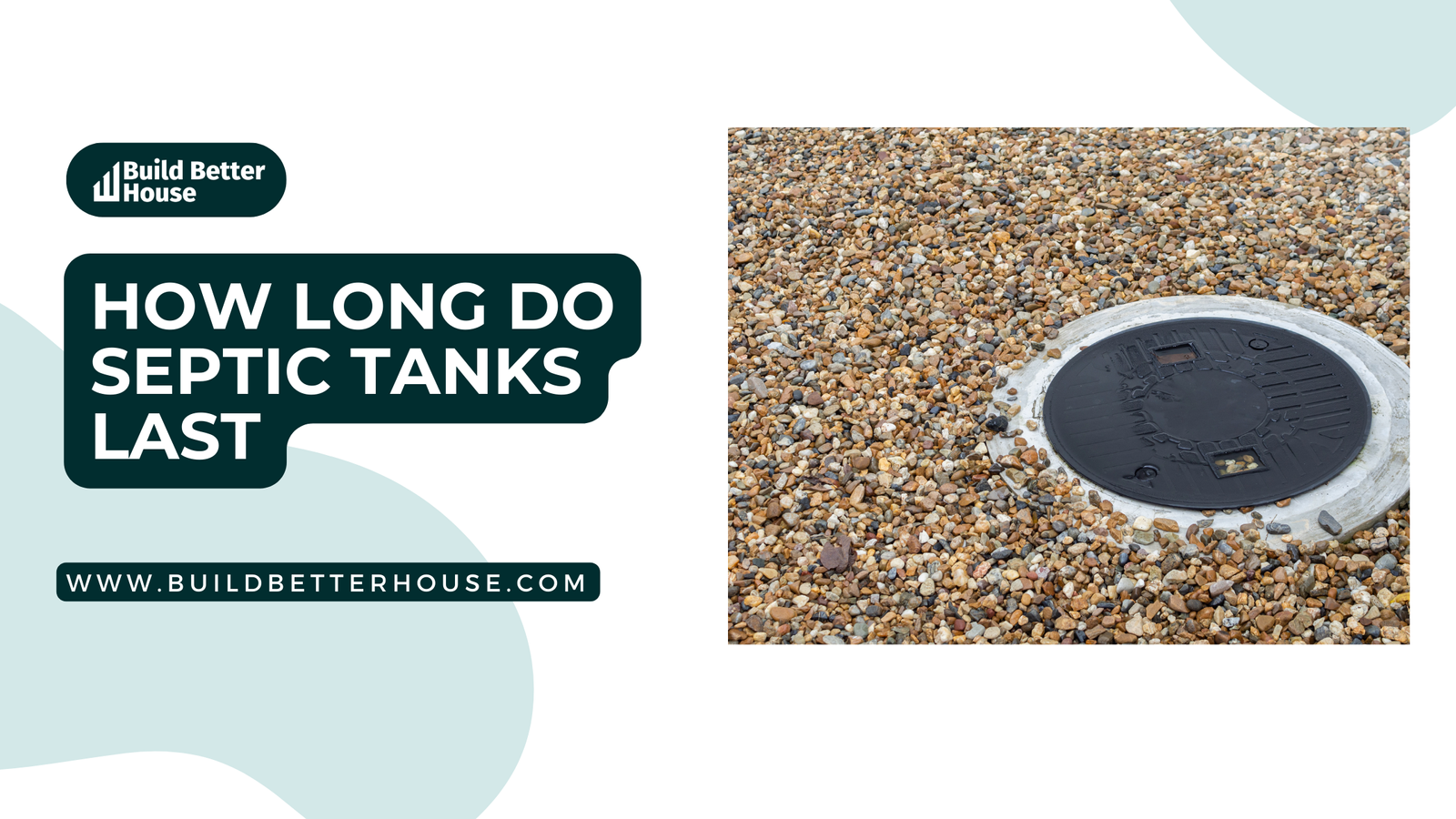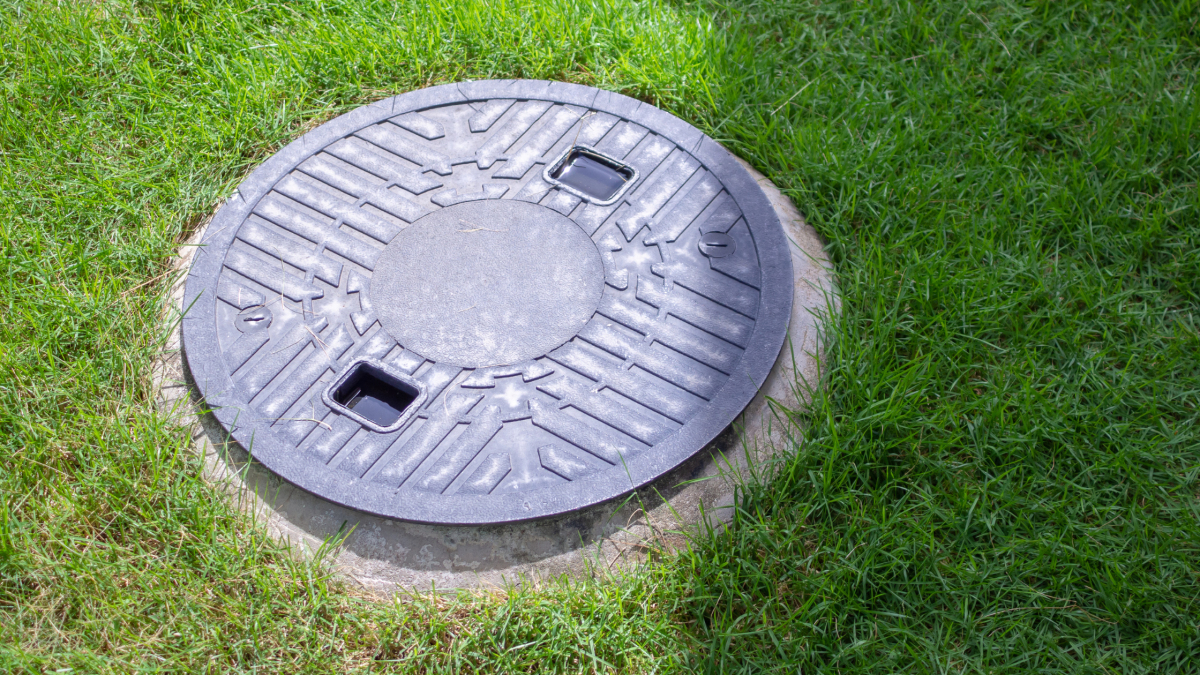How Long Do Septic Tanks Last: Factors Affecting Their Lifespan

When it comes to managing a home’s waste system, understanding the lifespan of a septic tank is crucial. A septic tank is an essential component of a home’s septic system, responsible for the treatment and disposal of household wastewater. They are commonly used in rural areas and properties without connection to municipal sewer systems. By recognizing the typical lifespan of a septic tank and the factors that influence it, you can ensure the proper functioning and maintenance of your system for many years.
The lifespan of a septic tank varies, depending on factors such as the type of material used, proper installation, and ongoing maintenance. On average, a well-maintained septic tank can last between 20 to 40 years. Knowing how to properly maintain your septic system can significantly affect its longevity and save you from costly repairs or replacements down the line.
Key Takeaways
- Septic tanks can last between 20 to 40 years, depending on factors like material and maintenance.
- Regular maintenance can greatly extend the lifespan of your septic system.
- Signs of septic tank failure must be addressed promptly to avoid costly repairs or replacements.
Understanding Septic Tanks

A septic tank is a watertight receptacle that’s buried in the ground and plays a vital role in treating wastewater for properties not connected to a municipal sewer system. Typically, septic tanks are made of three main materials: concrete, plastic, and steel. Each material has its advantages and disadvantages in terms of durability, maintenance, and lifespan.
Concrete septic tanks are the most common type found today due to their sturdy construction and relatively long-lasting nature. They can usually last around 20 to 30 years with proper maintenance, though this lifespan can be extended under ideal conditions. Steel septic tanks, on the other hand, are susceptible to corrosion and can have a shorter lifespan, usually around 15-20 years. Plastic and fiberglass septic tanks are lightweight and resistant to corrosion, with a general lifespan of around 20-40 years.
When it comes to septic systems, they are designed to manage household wastewater. The most common type is the conventional septic system, which consists of a septic tank and a drainage field or leach field. Two- to three-bedroom houses typically require a minimum tank capacity of 1,000 gallons. The wastewater from your home enters the septic tank through an inlet pipe, where solid waste settles at the bottom and lighter particles, such as grease and oils, rise to the top.
Inside the tank, baffles create separate compartments that help promote the settling of waste. Over time, naturally occurring bacteria in the tank break down the solid waste, while the liquid portion flows through an outlet pipe into the drainage field. Here, the wastewater is further treated by the soil, which acts as a natural filter.
In conclusion, it is essential to choose the right type and size of septic tank for your specific needs, taking into account the local soil and groundwater conditions. Proper installation and regular maintenance are key factors in ensuring the longevity and efficient performance of your septic system. By understanding the basics of septic tanks, you can make informed decisions and extend the life of your system.
Septic Tank Lifespan
A septic tank’s lifespan can vary greatly depending on several factors, such as the materials used, proper installation, maintenance, and surrounding soil conditions. On average, a well-maintained septic tank can last 20 to 30 years. However, this range can extend up to 40 years or more with proper care and attention.
Materials: The material of your septic tank plays a crucial role in determining its lifespan. Concrete septic tanks are the most common and can last up to 40 years, barring poorly mixed concrete or acidic soil conditions that could reduce their service life. Plastic or fiberglass septic tanks can also expect a similar life expectancy, provided they haven’t sustained any mechanical damage.
Installation and Maintenance: Proper installation of your septic tank system is essential to ensure it operates effectively and has a longer service life. Equally important is regular maintenance, such as pumping out the solids every 3 to 5 years, inspecting the drain field, and avoiding disposing of harmful substances into the system. A well-maintained tank will provide reliable service for 20 to 30 years or more.
Soil and Groundwater Conditions: The conditions of the soil and groundwater surrounding your septic tank system can impact its life expectancy. For instance, if the soil is too permeable, it may cause the system to become overloaded and suffer from premature failure. On the contrary, poorly draining soils can lead to the system becoming clogged and eventually failing. Understanding the specific conditions of your property and adjusting the system accordingly will help ensure a longer septic tank lifespan.
In conclusion, the lifespan of a septic tank is heavily influenced by factors such as its material, installation, maintenance, and soil conditions. By taking the necessary steps to address these aspects, you can ensure your septic system operates efficiently and lasts as long as possible. A well-maintained septic tank can serve you reliably for 20 to 30 years, and potentially even longer with proper care.
Factors Affecting Septic Tank Lifespan
Several factors can affect the lifespan of your septic tank, including the material it’s made of, usage, soil conditions, and maintenance. It’s essential to be aware of these factors to prolong the life of your septic system and avoid costly repairs.
Material plays a significant role in the longevity of a septic tank. Concrete septic tanks are the most common and can last 20 to 30 years, or even up to 50 years if well-maintained. Steel septic tanks tend to corrode and have a shorter lifespan, usually around 15 to 20 years. PVC and cast iron are also materials used for septic tanks, with varying lifespans depending on their quality and maintenance.
Usage and maintenance are critical for the lifespan of your septic tank. Regular pumping and inspection can keep it functioning well and extend its life. Overloading your septic system with excessive water usage or disposing of non-degradable items can strain your system and may lead to premature failure.
Soil type and water level in your property greatly impact the performance of your septic system, particularly the drain field. Well-draining soil is crucial for proper functioning, but soil that is either too dense or too porous can cause problems. High groundwater levels can also affect your septic system, as it may hinder the drain field from adequately treating the wastewater.
Proper maintenance of your drain field is also essential. If you notice foul odors or standing water near the area, it might be a sign that the drain field is not functioning correctly, and this can affect the septic tank’s performance and lifespan.
In conclusion, it’s essential to consider factors such as material, usage, soil conditions, and maintenance when assessing the lifespan of your septic tank. By being aware of these factors and taking proactive measures, you can ensure the longevity and proper functioning of your septic system.
Signs of Septic Tank Failure
A septic tank failure can lead to unpleasant consequences, so it’s crucial to know the signs that indicate it’s time to call a professional. By recognizing these symptoms, you can address the issue before it becomes a significant problem.
First, gurgling noises coming from your drains or toilets are a clear indicator that something is wrong with your septic system. These sounds often mean that your tank is clogged or facing difficulty in processing waste. Don’t ignore these noises, as they can quickly escalate into more severe issues.
Secondly, if you notice that your sinks, showers, or bathtubs are draining slowly, this could signal a problem with your septic tank. Slow draining may result from a clogged pipe or a failing septic system that isn’t efficiently breaking down waste.
Another sign of septic tank failure is if you find that your drains or toilets are backing up frequently. This could mean your tank is full and no longer able to process waste, which is a strong indication that it is time for maintenance or repairs.
Moreover, always be alert for any alarms that may go off in your septic system. Many modern septic tanks have alarm features that warn you about potential issues like overflowing or system failure. If your alarm is sounding, immediately contact a professional to assess the situation.
Lastly, unusual odors or wet spots around your drain field area might indicate a failing septic system. This could be a result of waste material overflowing or not being adequately broken down, leading to potential contamination of the surroundings.
In summary, pay attention to gurgling noises, slow draining, frequent backups, alarms, and unusual odors or wet spots. If you notice any of these signs, it’s essential to take action and consult a professional to evaluate and address the issue. Being proactive and addressing these symptoms early on will help maintain your septic system’s health and longevity.
Importance of Regular Maintenance
Regular maintenance of your septic tank plays a crucial role in extending its lifespan, which can range from 20 to 40 years or more if properly maintained. By staying ahead, you can save money by avoiding costly repairs or replacements, which can range from $5,000 to $15,000 for a conventional system.
A key aspect of septic maintenance is pumping your septic tank every three to five years. This ensures that waste and other debris do not accumulate, ultimately preventing clogs or other system malfunctions. For alternative systems with electrical float switches, pumps, or mechanical components, more frequent inspections, such as once a year, are advised.
During an inspection, professionals may examine the tank’s contents, checking for cracks, evaluating the leach field’s condition, and ensuring the proper functioning of pumps and filters. Occasionally, filters need replacing to keep the system operating efficiently.
Your septic system handles all your household’s sewage, so it’s crucial to take care of it. Avoid flushing objects that can clog the system or strain the leach field, such as grease, oil, or non-degradable waste. Regularary schedule inspections and address any necessary repairs to prevent more extensive damage.
Adhering to these routine maintenance measures not only can save you money and headaches but also help sustain your septic tank and leach field for the long run, making both environment- and budget-friendly choices in the process.
What to Avoid for Septic Tank Health
Taking care of your septic tank involves being mindful of what goes down the drain. By avoiding these common mistakes, you can extend the lifespan of your septic system and keep it working efficiently.
Firstly, be cautious about what you flush down the toilet. Only toilet paper and human waste should be flushed; never flush paper towels, cat litter, coffee grounds, or cigarette butts. These items can cause clogs and damage your septic system. It’s essential to use toilet paper that is septic-safe and breaks down quickly in water.
To maintain proper septic system health, avoid sending grease and fats down the drain. Grease can solidify in your pipes, causing blockages and backups. Instead, dispose of grease in a container and throw it in the trash.
Be mindful of the chemicals you pour down the drain as well. Harsh chemicals, like bleach, can kill the beneficial bacteria in your septic tank, disrupting the natural breakdown of waste. Opt for eco-friendly cleaning products and limit the use of chemical-laden drain cleaners.
Also, consider installing drain screens in your sinks and showers to catch hair, food particles, and other debris. This will prevent them from entering your septic system and causing clogs.
Keeping these tips in mind will help you maintain a healthy septic system so that it can function effectively for many years. Remember to follow the recommended septic tank pumping schedule, generally every 3 to 5 years, to ensure your system remains in peak condition.
Cost Factors: Installation, Maintenance and Replacement
When considering the cost of your septic system, there are several factors to take into account: installation, maintenance, and replacement. Understanding these factors will help you make an informed decision about your septic system.
Installation costs for septic systems vary based on tank material, the size of your household, and permit costs. Generally, you can expect to spend between $2,000 and $15,000 on a new septic system, with the average system costing about $7,000.
Maintenance is crucial to prolong the lifespan of your septic tank. Regular inspections are necessary to ensure your system is functioning correctly. Costs for inspections and pumping out your septic tank will depend on the service provider, but typically range from $200 to $500 for each service. Avoiding harsh chemicals that can damage your tank or kill beneficial bacteria, and keeping trees away from the drain field to prevent root encroachment, will also contribute to overall maintenance efficiency.
Replacement of a septic tank ranges from $3,000 to $10,000, depending on the type and size of the tank. Factors that can affect replacement costs include your tank’s capacity, groundwater conditions, and the presence of rust or damage to concrete tanks. Keep in mind that a well-maintained septic tank can last anywhere from 20 to 40 years or more, depending on the type of system, soil, and groundwater conditions in your area.
In conclusion, to manage and plan for the cost factors of installation, maintenance, and replacement, it’s essential to be informed about your septic system’s requirements. Properly maintaining your septic system will help to prolong its lifespan and reduce overall expenses. Use this information to make the best decisions for your household’s septic needs.
Septic Systems in Different Locales
If you live in a rural area or just outside city limits, you may be one of the 20% of households in the U.S. that uses a private septic system rather than a municipal sewer to dispose of household water and waste from kitchens and bathrooms. The lifespan of septic systems can vary depending on the locale, installation, and maintenance.
In areas with well-maintained septic tanks, these systems can last anywhere from 20 to 40 years or more. Proper maintenance includes regular pumping to remove solids from the tank, as well as inspecting the system for signs of potential issues. Your septic system’s longevity greatly depends on the type of system, soil and groundwater conditions, and proper usage.
The surrounding environment also impacts your septic system’s lifespan. For example, if your property has a lawn, it’s essential to avoid planting trees or shrubs too close to the septic tank or drain field, as their roots can cause damage over time. Also, be mindful of heavy vehicles or machinery driving over the soil covering the septic system, as this can lead to compaction and potential damage to the tank or pipes.
Here are a few factors to consider for septic systems in different locales:
- Soil type: The ability of soil to absorb and filter wastewater is crucial for a functioning septic system. Soil with good permeability is ideal, while heavy clay or rocky soils can hinder the system’s effectiveness.
- Groundwater table: If the water table is too high, it may interfere with the septic system’s proper functioning, leading to wastewater not being absorbed and treated correctly. In such cases, alternative septic systems, like mound systems or raised drain fields, may be necessary.
- Climate: In regions with freezing temperatures, ensure that your septic system is adequately insulated to prevent frozen pipes, which can lead to system failure.
Understanding the unique challenges posed by your locale will help you maintain a successful septic system. Proper care and preventative measures are key to ensuring your septic system continues to function effectively for many years.
Frequently Asked Questions
What is the average lifespan of a septic tank?
The average lifespan of a septic tank is between 20 to 40 years, depending on its construction material and how well it is maintained. Proper installation and regular maintenance are crucial in extending the life of a septic tank.
How often should a septic tank be pumped?
Household septic tanks should be pumped every three to five years. However, if your system has electrical float switches, pumps, or mechanical components, it may require more frequent inspections, such as once a year. A service contract can be helpful in ensuring proper maintenance of alternative septic systems.
What are signs of a full septic tank?
Watch for any of these signs, as they might indicate a full or failing septic tank:
* Slow drains or backups in your home
* Sewage odors inside or outside your home
* Gurgling sounds within plumbing fixtures
* Bright green, spongy grass around the septic tank area
* Standing water or wet patches near the drain field
How much does septic tank pumping cost?
The cost of pumping a septic tank can vary, typically ranging from $200 to $600, depending on factors such as tank size, location, and accessibility. It’s important to budget for this essential maintenance, as it is crucial for the longevity of your septic system.
How long does a septic tank replacement take?
A septic tank replacement can take anywhere from a few hours to a couple of days, depending on factors such as the size of the tank, the type of system you have, and the accessibility of the job site. Before a replacement, a contractor may need to obtain permits and coordinate with local authorities.
What affects a septic tank’s longevity?
Several factors can affect a septic tank’s longevity, including:
* Proper installation and construction material (concrete, fiberglass, or plastic)
Soil and groundwater conditions
Regular maintenance, including pumping and inspections
Appropriate use of household water and waste disposal practices (avoid flushing items that could clog the system or cause damage)






